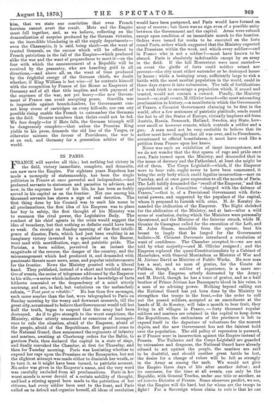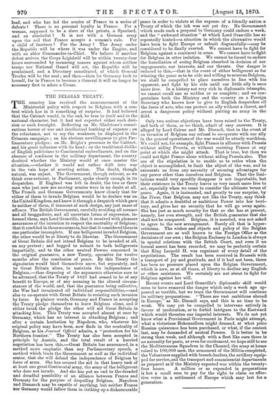IN PARIS.
FRANCE will survive all this ; but nothing but victory in the field, victory immediate, complete, and dramatic, can now save the Empire. For eighteen years Napoleon has made a monopoly of statesmanship, has been the single politician in France at once powerful and independent,—has preferred servants to statesmen and parasites to advisers, and now, in the supreme hour of his life, he has been as feebly served in his capital as on the frontier. Not one among his thousand servants has shown a sign of real devotion. The 'first thing done by his Council was to omit his name in all proclamations, the first idea of his Empress was to place her boy in safety, the first thought of his Ministry was to summon the rival power, the Legislative Body. The conduct of his chief agents in the crisis would suggest the idea of treachery, but that nothing so definite could have been so weak. On receipt on Sunday morning of the first intelli- gence of disaster, Paris, which had just been exulting in an imaginary victory invented by a speculator on the Bourse, went mad with mortification, rage, and patriotic pride. The Parisian, a born soldier, perceived in an instant the magnitude of the reverse, the danger of the country, and the mismanagement which had produced it, and demanded with passionate threats more news, arms, and popular reinforcements for the frontier. News the Ministry granted with a liberal hand. They published, instead of a short and truthful narra- tive of events, the series of telegrams addressed by the Emperor to his wife,—a series which indicate either a knowledge of facts hitherto concealed or the despondency of a mind utterly unstrung, and are, in fact, but variations on the melancholy refrain, "Tout peut se re'tablir." No less than five messages, each more sombre than the last, were telegraphed to Paris on Sunday morning by the weary and downcast monarch, till the great city, accustomed to believe thatGovernment would tell but half the truth, began to suspect that the army had been destroyed. As if to give strength to the worst suspicions, the Ministry, either utterly unmanned or conscious of incompet- ence to rule the situation, afraid of the Emperor, afraid of the people, afraid of the Republicans, first granted arms to the National Guard, then summoned the regiments of infantry and marines, awaiting at Cherbourg orders for the Baltic, to garrison Paris, then declared the capital in a state of siege, and finally convoked the Chamber, at first for Thursday, and then for Tuesday morning. Paris was hesitating whether to .expend her rage upon the Prussians or the Bonapartes, but not the slightest attempt was made either to diminish her wrath, or to turn it, as it might have been turned, to patriotic account. No order was given in the Emperor's name, and the very word was carefully excluded from all proclamations. Paris in her worst moods is never devoid of a certain nobility of thought, and had a stirring appeal been made to the patriotism of her citizens, had every soldier been sent to the front, and Paris called on to defend and organize herself, all ideas of revolution
would have been postponed, and Paris would have formed an army of reserve ; but there was no sign even of a possible unity between the Government and the capital. Arms were refused except upon condition of an immediate march to the frontier. Orders were issued for works to be executed on the forts round Paris, orders which suggested that the Ministry expected the Prussians within the week, and which every soldier—and in France who is not a soldier ?—must have known to be absurd. Paris is absolutely indefensible except by an army in the field. If the hill Montretout were once carried— an event the girdle of forts could neither retard nor prevent—the city must either surrender or be destroyed house by house ; while a besieging army, sufficiently large to risk a battle with the most martial population in the world, could in three days starve it into submission. The talk of fortifications is a weak trick to encourage a population which, if armed and trusted, would not contain a coward. Finally, the Ministry issued—or, at all events, M. 011ivier issued—the most astounding proclamation in history,—a manifesto in which the Government of France, a Cwsarist Government claiming to be first in the world, after a few sentences of patriotic platitude, sends round the hat to all the States of Europe, virtually implores aid from Austria, Russia, Denmark, Holland, Sweden, any State, how- ever small or however remote, which controls a soldier and a gun. A man need not be very excitable to believe that its author must have thought that all was over, and to Frenchmen, accustomed to official boastfulness, it must have read like a petition from France upon her knees.
Never was such an exhibition of inept incompetence, and we do not wonder that the first spasm of rage and pride once over, Paris turned upon the Ministry, and demanded that in the name of decency and the Fatherland, at least she might be rid of them. The Corps Legislatif—which, if the Emperor were to bear rule, ought never to have been summoned, it being the only body which could legalize insurrection—met on Tuesday, and at once gave expression to all the moods of Paris. The Left boldly demanded the "recall of the Emperor," and the appointment of a Committee "charged with the defence of France,"—that is, of a Provisional Government with dicta- torial powers, and supported by the populace of the capital, whom it proposed to furnish with arms. M. de Keratry de- manded the abdication of the Emperor. The Right shrieked for the abdication of the Ministry, and at last—after a wild scene of confusion, during which the Ministers were personally threatened, and the Minister of the Interior struck, while M. Granier de Cassagnac called for the execution of the Left, and M. Jules Simon, inaudible from the uproar, beat his breast to imply that he longed for the Government bullets—M. Clement Duvernois introduced a resolution of want of confidence. The Chamber accepted it—we are not told by what majority—and M. 011ivier resigned ; and the Empress replaced the quasi-Constitutionalists by a Cabinet of Mamelukes, with General Montauban as Minister of War and M. Jerome David as Minister of Public Works. No new man has a seat, and no man of genius, for the Comte de Palikao, though a soldier of experience, is a mere ser- vant of the Empress, utterly distrusted by the Army ; and M. David, though he has a trace of genius, and as a half brother of Prince Jerome has Buonaparte blood in his veins, is a man of no advising power. Nothing beyond calling out the National Guard has yet been done by the Ministry to strengthen the troops in the front,—for the order to call out the passed soldiers, accepted as an amendment at the hands of M. de Keratry, will take a month to bear fruit, they living in all villages in France, — forty thousand regular soldiers and marines are retained in the capital to keep down the Republicans, the enthusiasm of the provinces is left to expend itself in the departure of volunteers for the nearest depots, and the new Government has not the faintest hold over the population. The old policy of repression is pursued, as if France were in insurrection against the Empire instead of Prussia. The Tuileries and the Corps Legislatif are guarded by cuirassiers and dragoons, the National Guard have already refused to act against the people, the marines are said to be doubtful, and should another great battle be lost, the desire for a change of rulers will be felt as strongly in the Army as among the mob. We would not give the Empire three days of life after another defeat ; and its successor, for the time at all events, can only be the Republic, with General Trochu, under one title or another, as ad interim Dictator of France. Some observers predict, we see, that the Empire will die hard, but for whom are the troops to fight? For a Sovereign whose claim to rule is that he can
lead, and who has led the armies of France to a series of defeats ? There is no personal loyalty in France. For a woman, supposed to be a slave of the priests, a Spaniard, and an absolutist ? It is not with a German army upon the soil that France accepts a woman's rule. For a child of fourteen ? For the Army ? The Army under the Republic will be where it was under the Empire, and with an abler Commander-in-Chief. We believe if another defeat arrives, the Corps Legislatif will be within twenty-four hours surrounded by menacing masses against whom neither troops nor National Guard will act, the Republic will be proclaimed, and a Directory constituted, of which General Trochu will be the soul ; and then—then let Germany look to herself, for in France to become a General it will no longer be necessary first to adore a Oxsar.































 Previous page
Previous page